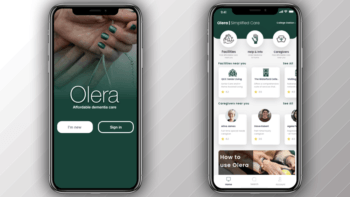Aggies Develop Mobile Solution For Finding Elderly Care

Even before the coronavirus pandemic hit, finding elderly care was becoming more difficult in the United States. Trying to find the right facility while balancing budget, health concerns and time were challenges that COVID-19 compounded. An interdisciplinary team of student researchers from Texas A&M University are working toward a mobile solution.
“Dealing with the mental trauma of watching a loved one’s memories and mental faculties deteriorate is difficult enough,” said team member TJ Falohun, biomedical engineering doctoral student. “Individuals in this position should not have to struggle to find the information that they need to make the best decision on finding care for their loved one.”
With their application, Olera, the team aims to provide a resource for children or spouses of elderly individuals in need of professional care and connects them to local care options. While the name Olera doesn’t stand for anything, Falohun said it evokes a feeling of balance, lightness and tranquility that represents the vision of their venture.
“This not only lowers the stress involved with finding care, but it drastically reduces the time that this process would otherwise take,” said member Carter Radocha, a computer engineering junior. “Upon logging in, users will have the ability to filter local facilities by price, location and offered medical services, information that would otherwise be time consuming to obtain.”
The team, which also includes business administration graduate student Logan DuBose, biomedical engineering senior Jesse Phipps and biomedical engineering graduate student Chidinma Nzedibe, formed through participation in Sling Health, a student organization in which groups tackle unmet clinical needs in interdisciplinary teams. The members wanted to address Alzheimer’s and dementia.
Before they even began app development, they needed more information on what needs there were in the elder care community. Team members participated in the National Science Foundation’s Innovation Corps (I-Corps) Site Fellows Program at Texas A&M this summer, where they interviewed 40 people familiar with the process of searching for elderly care. This helped them learn about one of the greatest challenges they would have to address — a lack of knowledge on what to do when a loved one needs to be moved to a long-term care facility.
“We imagine that our service will redefine how people seek senior care,” Radocha said. “Having one consolidated resource that is simplified and easy to use for anyone can significantly reduce the time spent seeking out care and increase first time matching of a care option for a senior.”
Magda Lagoudas, executive director industry/nonprofit partnerships in the College of Engineering, said the program has impacted more than 100 student teams such as Olera on campus by providing training, mentor support and funding.
“It was great working with Olera in the site program this summer, and I am super excited to see them continue their work on a very important issue for our society,” Lagoudas said.
Moving forward, the team plans to launch a limited beta test to test and refine the product. They also are focusing on entrepreneurial efforts, are now in the process of forming an LLC and connecting with early adopters interested in their service.
“Less than a year ago, Olera was nothing but an idea,” Falohun said. “Currently, we have a hardworking team of eight students, a prototype and several early adopters who are eager for our product launch. By keeping the needs of our users first, we believe we can overcome any obstacles that may arise and create a digital platform that will revolutionize elderly and dementia care.”
This article by Jennifer Reiley originally appeared on the College of Engineering website.





